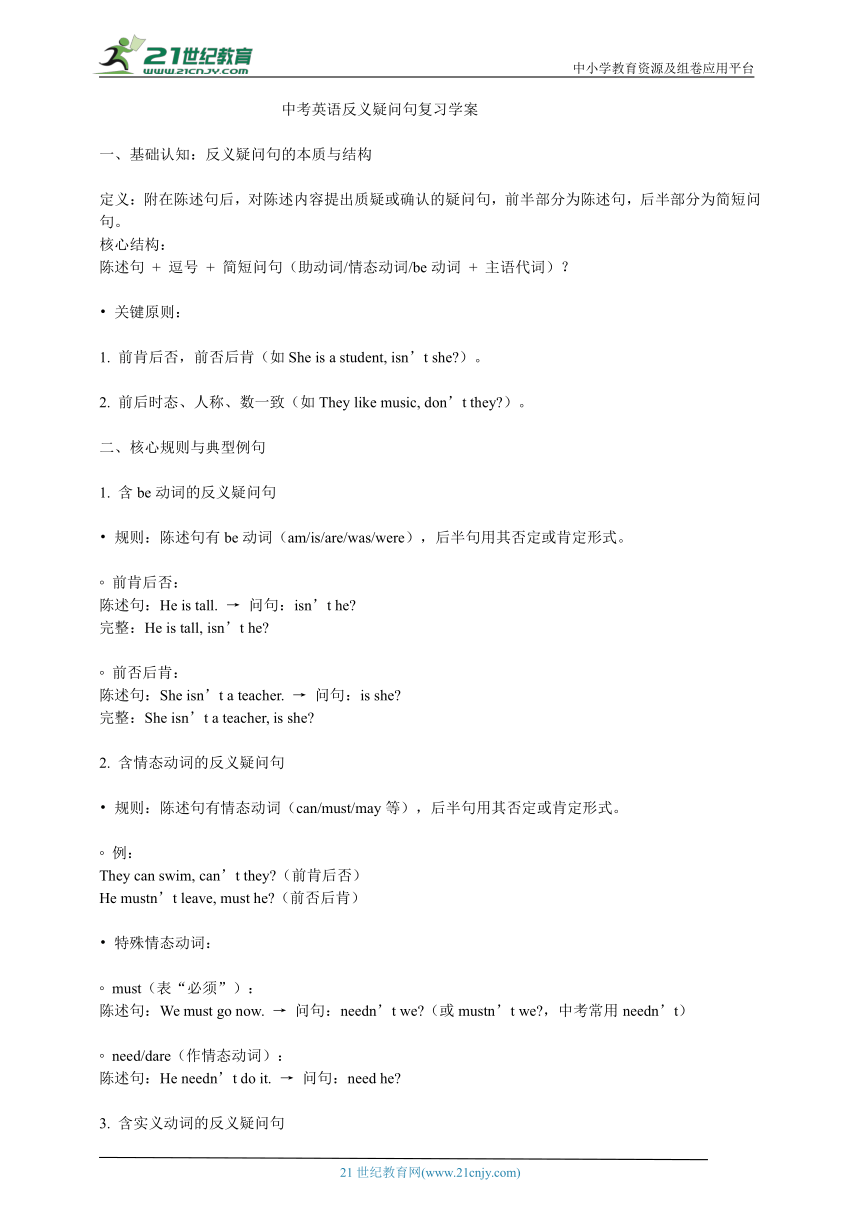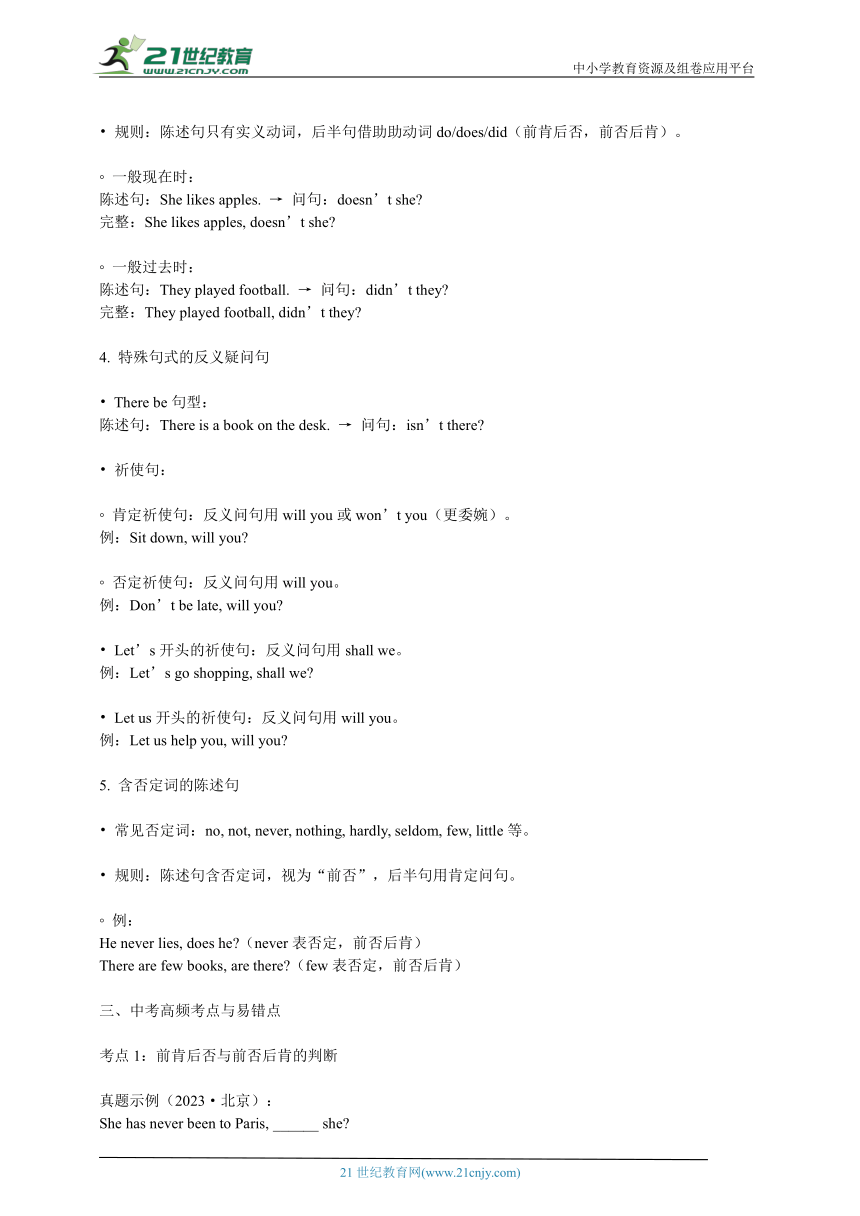中考英语语法复习学案(反义疑问句)
图片预览


文档简介
中小学教育资源及组卷应用平台
中考英语反义疑问句复习学案
一、基础认知:反义疑问句的本质与结构
定义:附在陈述句后,对陈述内容提出质疑或确认的疑问句,前半部分为陈述句,后半部分为简短问句。
核心结构:
陈述句 + 逗号 + 简短问句(助动词/情态动词/be动词 + 主语代词)?
关键原则:
1. 前肯后否,前否后肯(如She is a student, isn’t she )。
2. 前后时态、人称、数一致(如They like music, don’t they )。
二、核心规则与典型例句
1. 含be动词的反义疑问句
规则:陈述句有be动词(am/is/are/was/were),后半句用其否定或肯定形式。
前肯后否:
陈述句:He is tall. → 问句:isn’t he
完整:He is tall, isn’t he
前否后肯:
陈述句:She isn’t a teacher. → 问句:is she
完整:She isn’t a teacher, is she
2. 含情态动词的反义疑问句
规则:陈述句有情态动词(can/must/may等),后半句用其否定或肯定形式。
例:
They can swim, can’t they (前肯后否)
He mustn’t leave, must he (前否后肯)
特殊情态动词:
must(表“必须”):
陈述句:We must go now. → 问句:needn’t we (或mustn’t we ,中考常用needn’t)
need/dare(作情态动词):
陈述句:He needn’t do it. → 问句:need he
3. 含实义动词的反义疑问句
规则:陈述句只有实义动词,后半句借助助动词do/does/did(前肯后否,前否后肯)。
一般现在时:
陈述句:She likes apples. → 问句:doesn’t she
完整:She likes apples, doesn’t she
一般过去时:
陈述句:They played football. → 问句:didn’t they
完整:They played football, didn’t they
4. 特殊句式的反义疑问句
There be句型:
陈述句:There is a book on the desk. → 问句:isn’t there
祈使句:
肯定祈使句:反义问句用will you或won’t you(更委婉)。
例:Sit down, will you
否定祈使句:反义问句用will you。
例:Don’t be late, will you
Let’s开头的祈使句:反义问句用shall we。
例:Let’s go shopping, shall we
Let us开头的祈使句:反义问句用will you。
例:Let us help you, will you
5. 含否定词的陈述句
常见否定词:no, not, never, nothing, hardly, seldom, few, little等。
规则:陈述句含否定词,视为“前否”,后半句用肯定问句。
例:
He never lies, does he (never表否定,前否后肯)
There are few books, are there (few表否定,前否后肯)
三、中考高频考点与易错点
考点1:前肯后否与前否后肯的判断
真题示例(2023·北京):
She has never been to Paris, ______ she
A. has B. hasn’t C. does D. doesn’t
答案:A(never表否定,前否后肯,助动词用has)
考点2:情态动词must的反义问句
易错点:must表“必须”时,反义问句可用needn’t或mustn’t,但中考多考needn’t。
例句:
We must finish the work, needn’t we (√正确)
考点3:祈使句的反义问句
错误案例:
Don’t forget to call me, don’t you (×错误)
正确:Don’t forget to call me, will you (否定祈使句用will you)
考点4:主语为不定代词的反义问句
陈述句主语为everyone/everybody/someone等:反义问句主语用they(指代复数)。
例:Everyone likes the movie, don’t they
陈述句主语为everything/nothing等:反义问句主语用it。
例:Nothing is impossible, is it
考点5:含宾语从句的反义问句
规则:反义问句与主句一致,除非主句主语是I,且谓语动词为think/believe等,此时与从句一致。
例:
He thinks she is right, doesn’t he (与主句he thinks一致)
I believe they will come, won’t they (主句主语是I,与从句they will come一致)
四、阶梯式巩固练习
A. 基础题(补全反义问句)
1. She is a doctor, ______ ______ (前肯后否)
答案:isn’t she
2. They can speak English, ______ ______ (前肯后否)
答案:can’t they
3. He doesn’t like coffee, ______ ______ (前否后肯)
答案:does he
B. 提升题(完成反义疑问句)
1. There are many books, ______ ______
答案:aren’t there
2. Don’t open the window, ______ ______
答案:will you
3. Let’s go to the park, ______ ______
答案:shall we
C. 中考真题实战
1. (2024·上海)You hardly know each other, ______ you
A. do B. don’t C. did D. didn’t
解析:hardly表否定,前否后肯,一般现在时用do,选A。
2. (2023·广东)He has a new bike, ______ he
A. hasn’t B. doesn’t C. isn’t D. wasn’t
解析:has是实义动词“拥有”,前肯后否,用doesn’t,选B。
3. (2022·北京)Pass me the pen, ______ you
A. shall B. will C. do D. can
解析:肯定祈使句用will you,选B。
五、备考口诀与关键技巧
1. 记忆口诀
前肯后否,前否后肯,助动情态be动词,主语代词跟在后。
否定词现前句中,后句肯定莫忘记,祈使句后用will,Let’s对应shall we。
2. 解题四步法
1. 判断肯否:确定陈述句是肯定还是否定(注意隐性否定词如never, hardly)。
2. 找动词:提取陈述句中的be动词、情态动词或助动词(实义动词需借助do/does/did)。
3. 变形式:前肯后否(如is→isn’t),前否后肯(如can’t→can)。
4. 换主语:陈述句主语换为相应代词(如he/she/they/it/there)。
3. 常见错误清单
错误类型 错误示例 正确形式
前否后否 She isn’t a student, isn’t she She isn’t a student, is she
助动词错误 He likes music, don’t he He likes music, doesn’t he
祈使句反义问句错误 Let’s go, will we Let’s go, shall we
否定词漏判 Few people came, didn’t they Few people came, did they
六、知识框架速记
反义疑问句核心要点:
1. 基本结构:陈述句 + 简短问句(前肯后否,前否后肯)。
2. 动词选择:
有be动词/情态动词:直接用其否定或肯定形式。
实义动词:借助do/does/did。
3. 特殊句式:
There be句型:问句用there。
祈使句:肯定用will/won’t you,否定用will you。
Let’s:用shall we;Let us:用will you。
4. 否定词:never/hardly/few等视为前否,后句用肯定。
学习建议:每天练习10道反义疑问句题目,重点突破含否定词和祈使句的题型,结合错题本总结规律,考试中先判断肯否,再确定动词和主语,确保每一步准确无误!
21世纪教育网 www.21cnjy.com 精品试卷·第 2 页 (共 2 页)
HYPERLINK "http://21世纪教育网(www.21cnjy.com)
" 21世纪教育网(www.21cnjy.com)
中考英语反义疑问句复习学案
一、基础认知:反义疑问句的本质与结构
定义:附在陈述句后,对陈述内容提出质疑或确认的疑问句,前半部分为陈述句,后半部分为简短问句。
核心结构:
陈述句 + 逗号 + 简短问句(助动词/情态动词/be动词 + 主语代词)?
关键原则:
1. 前肯后否,前否后肯(如She is a student, isn’t she )。
2. 前后时态、人称、数一致(如They like music, don’t they )。
二、核心规则与典型例句
1. 含be动词的反义疑问句
规则:陈述句有be动词(am/is/are/was/were),后半句用其否定或肯定形式。
前肯后否:
陈述句:He is tall. → 问句:isn’t he
完整:He is tall, isn’t he
前否后肯:
陈述句:She isn’t a teacher. → 问句:is she
完整:She isn’t a teacher, is she
2. 含情态动词的反义疑问句
规则:陈述句有情态动词(can/must/may等),后半句用其否定或肯定形式。
例:
They can swim, can’t they (前肯后否)
He mustn’t leave, must he (前否后肯)
特殊情态动词:
must(表“必须”):
陈述句:We must go now. → 问句:needn’t we (或mustn’t we ,中考常用needn’t)
need/dare(作情态动词):
陈述句:He needn’t do it. → 问句:need he
3. 含实义动词的反义疑问句
规则:陈述句只有实义动词,后半句借助助动词do/does/did(前肯后否,前否后肯)。
一般现在时:
陈述句:She likes apples. → 问句:doesn’t she
完整:She likes apples, doesn’t she
一般过去时:
陈述句:They played football. → 问句:didn’t they
完整:They played football, didn’t they
4. 特殊句式的反义疑问句
There be句型:
陈述句:There is a book on the desk. → 问句:isn’t there
祈使句:
肯定祈使句:反义问句用will you或won’t you(更委婉)。
例:Sit down, will you
否定祈使句:反义问句用will you。
例:Don’t be late, will you
Let’s开头的祈使句:反义问句用shall we。
例:Let’s go shopping, shall we
Let us开头的祈使句:反义问句用will you。
例:Let us help you, will you
5. 含否定词的陈述句
常见否定词:no, not, never, nothing, hardly, seldom, few, little等。
规则:陈述句含否定词,视为“前否”,后半句用肯定问句。
例:
He never lies, does he (never表否定,前否后肯)
There are few books, are there (few表否定,前否后肯)
三、中考高频考点与易错点
考点1:前肯后否与前否后肯的判断
真题示例(2023·北京):
She has never been to Paris, ______ she
A. has B. hasn’t C. does D. doesn’t
答案:A(never表否定,前否后肯,助动词用has)
考点2:情态动词must的反义问句
易错点:must表“必须”时,反义问句可用needn’t或mustn’t,但中考多考needn’t。
例句:
We must finish the work, needn’t we (√正确)
考点3:祈使句的反义问句
错误案例:
Don’t forget to call me, don’t you (×错误)
正确:Don’t forget to call me, will you (否定祈使句用will you)
考点4:主语为不定代词的反义问句
陈述句主语为everyone/everybody/someone等:反义问句主语用they(指代复数)。
例:Everyone likes the movie, don’t they
陈述句主语为everything/nothing等:反义问句主语用it。
例:Nothing is impossible, is it
考点5:含宾语从句的反义问句
规则:反义问句与主句一致,除非主句主语是I,且谓语动词为think/believe等,此时与从句一致。
例:
He thinks she is right, doesn’t he (与主句he thinks一致)
I believe they will come, won’t they (主句主语是I,与从句they will come一致)
四、阶梯式巩固练习
A. 基础题(补全反义问句)
1. She is a doctor, ______ ______ (前肯后否)
答案:isn’t she
2. They can speak English, ______ ______ (前肯后否)
答案:can’t they
3. He doesn’t like coffee, ______ ______ (前否后肯)
答案:does he
B. 提升题(完成反义疑问句)
1. There are many books, ______ ______
答案:aren’t there
2. Don’t open the window, ______ ______
答案:will you
3. Let’s go to the park, ______ ______
答案:shall we
C. 中考真题实战
1. (2024·上海)You hardly know each other, ______ you
A. do B. don’t C. did D. didn’t
解析:hardly表否定,前否后肯,一般现在时用do,选A。
2. (2023·广东)He has a new bike, ______ he
A. hasn’t B. doesn’t C. isn’t D. wasn’t
解析:has是实义动词“拥有”,前肯后否,用doesn’t,选B。
3. (2022·北京)Pass me the pen, ______ you
A. shall B. will C. do D. can
解析:肯定祈使句用will you,选B。
五、备考口诀与关键技巧
1. 记忆口诀
前肯后否,前否后肯,助动情态be动词,主语代词跟在后。
否定词现前句中,后句肯定莫忘记,祈使句后用will,Let’s对应shall we。
2. 解题四步法
1. 判断肯否:确定陈述句是肯定还是否定(注意隐性否定词如never, hardly)。
2. 找动词:提取陈述句中的be动词、情态动词或助动词(实义动词需借助do/does/did)。
3. 变形式:前肯后否(如is→isn’t),前否后肯(如can’t→can)。
4. 换主语:陈述句主语换为相应代词(如he/she/they/it/there)。
3. 常见错误清单
错误类型 错误示例 正确形式
前否后否 She isn’t a student, isn’t she She isn’t a student, is she
助动词错误 He likes music, don’t he He likes music, doesn’t he
祈使句反义问句错误 Let’s go, will we Let’s go, shall we
否定词漏判 Few people came, didn’t they Few people came, did they
六、知识框架速记
反义疑问句核心要点:
1. 基本结构:陈述句 + 简短问句(前肯后否,前否后肯)。
2. 动词选择:
有be动词/情态动词:直接用其否定或肯定形式。
实义动词:借助do/does/did。
3. 特殊句式:
There be句型:问句用there。
祈使句:肯定用will/won’t you,否定用will you。
Let’s:用shall we;Let us:用will you。
4. 否定词:never/hardly/few等视为前否,后句用肯定。
学习建议:每天练习10道反义疑问句题目,重点突破含否定词和祈使句的题型,结合错题本总结规律,考试中先判断肯否,再确定动词和主语,确保每一步准确无误!
21世纪教育网 www.21cnjy.com 精品试卷·第 2 页 (共 2 页)
HYPERLINK "http://21世纪教育网(www.21cnjy.com)
" 21世纪教育网(www.21cnjy.com)
同课章节目录
- 词法
- 名词
- 动词和动词短语
- 动词语态
- 动词时态
- 助动词和情态动词
- 非谓语动词
- 冠词
- 代词
- 数词和量词
- 形容词副词及其比较等级
- 介词和介词短语
- 连词和感叹词
- 构词法
- 相似、相近词比较
- 句法
- 陈述句
- 一般疑问句和否定疑问句
- 特殊疑问句及选择疑问句
- 反意疑问句
- 存在句(There be句型)
- 宾语从句
- 定语从句
- 状语从句
- 主谓一致问题
- 简单句
- 并列句
- 复合句
- 主谓一致
- 主、表语从句
- 名词性从句
- 直接引语和间接引语
- 虚拟语气
- 感叹句
- 强调句
- 倒装句
- 祈使句
- 句子的成分
- 句子的分类
- 题型专区
- 单项选择部分
- 易错题
- 完形填空
- 阅读理解
- 词汇练习
- 听说训练
- 句型转换
- 补全对话
- 短文改错
- 翻译
- 书面表达
- 任务型阅读
- 语法填空
- 其他资料
